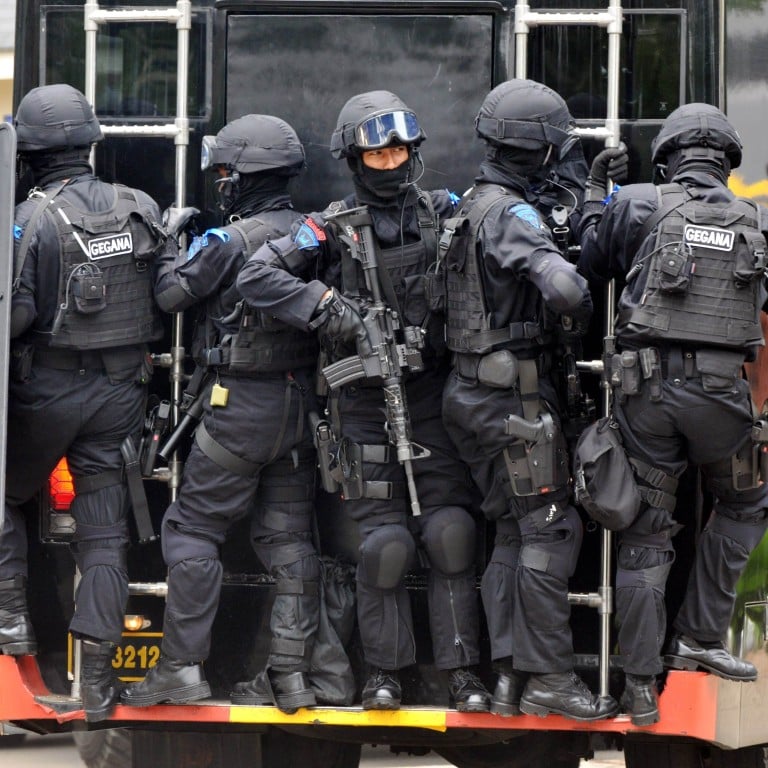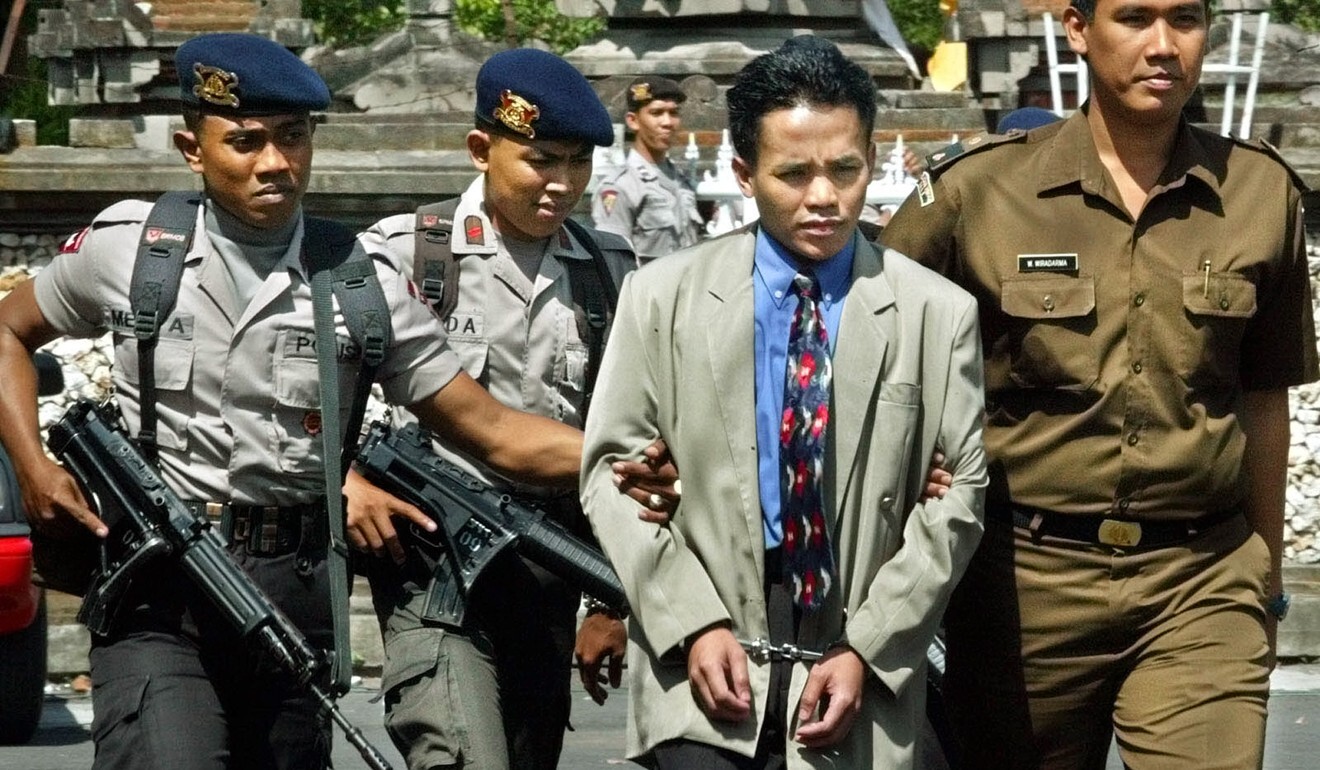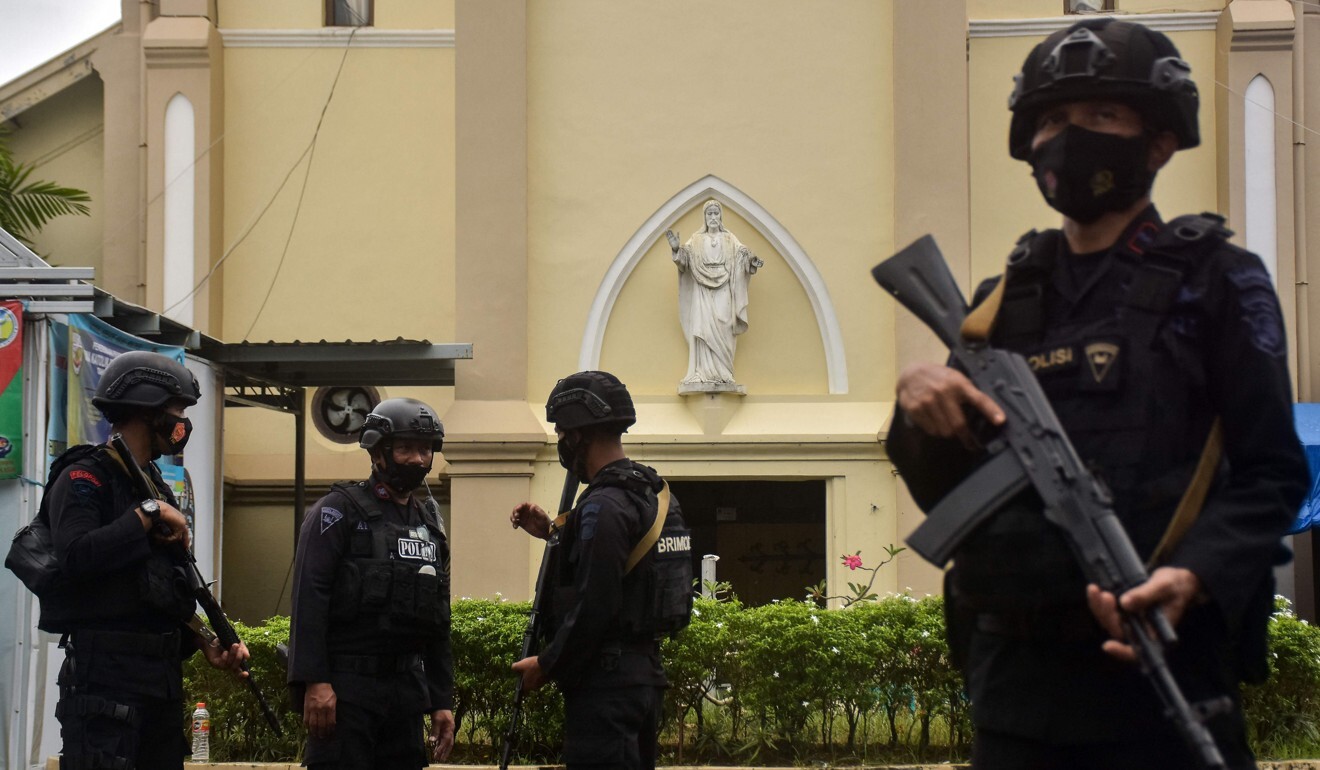
‘Terror season’ fears as Indonesia arrests over 100 suspected extremists and Japan issues threat warning
- Elite counter terror squad Densus 88’s arrests of Jemaah Islamiah and Isis-linked Jamaah Ansharut Daulah members comes as Japan warns six Southeast Asian countries of possible attacks
- Period surrounding September 11 and Bali bombing anniversaries is seen as high risk. Jailed Bali bomber Ali Imron tells This Week in Asia an imminent attack is unlikely, but expert says factions within the groups may have other ideas
“Absolutely, something could be percolating in terms of fresh attacks following these arrests,” said Alif Satria, a researcher in the department of politics and social change at the Centre for Strategic and International Studies (CSIS) Indonesia.
“I think the most relevant markers of a ‘terror season’ are usually the beginning of Ramadan, the anniversary of the Bali bomb, and the anniversary of 9/11.”

But it refused to provide the source of the information or say whether it was shared with other countries, the Associated Press reported.
Singapore’s Internal Security Department on Tuesday told broadcaster Channel NewsAsia it knew of “no specific threat nor credible intelligence of an imminent terrorist threat to Singapore”.
“We have reached out to our Japanese counterparts, and they also have no specific intelligence,” it said.
“We take this matter very seriously. Our security agencies, in particular [the police] are currently assessing the situation very carefully,” it said.
Why are Indonesian women being targeted for recruitment by Isis-linked groups?
Thai security agencies had no information of their own about a possible threat, said deputy police spokesman Kissana Pathanacharoen.
Similarly, the Philippine Department of Foreign Affairs said it was not aware of any information about an elevated threat level, while the Indonesian foreign ministry spokesman Teuku Faizasyah denied that any warning had been sent to Japanese citizens there, the Associated Press reported.
‘SEVERE IMPACT’
Satria said both JI and JAD were likely to have been “severely impacted” by the recent arrests.
“But we can expect Jamaah Ansharut Daulah to be more resilient in the short term,” he said. “Jamaah Ansharut Daulah cells operate in a decentralised and independent manner. This means the activities of one cell are not dependent on the activities of another. This is different from Jemaah Islamiah, which has a very centralised and interdependent structure.”

Former JI operative Ali Imron, who is serving a life sentence for his role in the 2002 Bali Bombing and who spoke to This Week in Asia from prison, said he did not think developments in Afghanistan had much bearing on the activities of JI.
“Jemaah Islamiah was never officially part of the Taliban, and in fact Jemaah Islamiah was in Afghanistan before the emergence of the Taliban,” he said. “There was a relationship between Jemaah Islamiah members and al-Qaeda leader Osama bin Laden, who at that time had a relationship with the Taliban, but Jemaah Islamiah is not necessarily going to be influenced by action in other places nowadays.”
Following their arrests, some of the members of JI confessed to police they had been planning attacks on August 17, Indonesia’s Independence Day. While some have written the claims off as bravado, if true, it would mark the first new wave of violence by the group since 2011 when some of its members attacked a police mosque in Cirebon in Java.
“God willing, there will not be any imminent attacks in Indonesia,” Imron said.
A former member of JAD, speaking on condition of anonymity, agreed that the recent arrests, while worrying, did not indicate that extremists from JAD were planning attacks in the coming weeks or months, nor did he think there would be terrorist action in Indonesia in support of the Taliban takeover in Afghanistan.
Indonesia on alert after Isis-linked group MIT beheads farmer
“For a long time, Isis has considered the Taliban’s struggle to have deviated from the right path,” he said, using an acronym for Islamic State.
“The main narrative we used to receive from Isis when I was a member of Jamaah Ansharut Daulah was that the Taliban fought on the basis of nationalism, not for the establishment of Islam. So, ideologically the Taliban is very different from Isis.”
He said that the arrests of JAD members should not be considered indicative of an imminent threat as many of the arrests were related to individuals providing funding for JAD groups rather than planning coordinated attacks on the ground.
But Satria of the CSIS said there was cause for concern, as JAD’s “adoption of Isis’ strategy of ‘attacking whenever you can’ has attracted the kind of recruits that would be more eager to retaliate to these kinds of arrests”.

He referred to how two suicide bombers attacked a Catholic Church in Makassar in South Sulawesi on the first day of the Easter Holy Week this year, noting that the attack was “motivated in part as a retaliation and revenge to the capture of a cell in Makassar and Gowa called the Villa Mutiara Cell”.
In contrast, JI had adopted a strategy of patient rebuilding, Satria said, and the kinds of recruits that the group had amassed this past decade suggested they would not retaliate as easily.
Moreover, JI as an organisation had barred its members from conducting any form of attack until they were deemed “ready”, he added.
“That said, this does not mean that every Jemaah Islamiah member will comply,” Satria said. “It is not a monolithic organisation as there are multitudes of factions within it. Some of them are more eager to act than others. For example, in 2019 a cell led by member Imaruddin was frustrated that Jemaah Islamiah did not act after the capture of its leaders, and planned to attack Chinese stores in retaliation.”
Indonesian terrorists planned to attack shops in areas with Chinese communities
Other analysts in the region have called for calm, particularly regarding the surprise arrests of JI operatives.
In the Institute for Policy Analysis of Conflict’s latest report, “The Impact of the Taliban Victory on Indonesia’s Jemaah Islamiah”, director Sana Jaffrey said: “All indications are that in the short-term, Jemaah Islamiah does not pose a significant threat ... [but] the group could probably reopen channels of communication with al-Qaeda should it wish to do so given that it still has some cadre abroad.”
“Its likely priority, however, will be on rebuilding at home. The pro-Isis groups remain the ones to watch.”
Additional reporting by Arif Budi Setyawan and Associated Press

